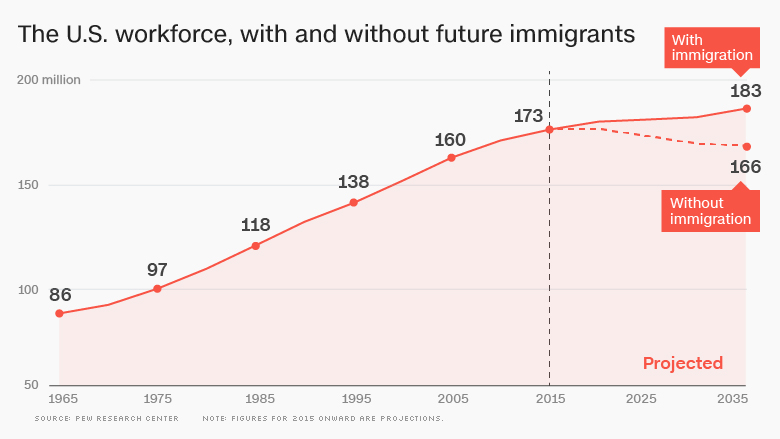
With Baby Boomers set to retire in droves, the U.S. will need a steady flow of immigrants to keep its workforce growing over the next couple of decades, a new report from Pew Research finds.
Without immigrants, Pew projects the total U.S. workforce population -- those ages 25 to 64 -- would fall from 173.2 million in 2015 to 165.6 million in 2035. But if the current rate of both legal and unauthorized immigration remains steady, Pew projects that the number of working-age adults will rise to 183.2 million in 2035.
New immigrant arrivals would account for all of those gains, researchers said.
That's because the largest portion of the working population, people born in the U.S. to parents who were also born here, is shrinking. According to Pew, this segment of the workforce is expected to fall from 128.3 million people in 2015 to 120.1 million by 2035. U.S.-born workers will go from accounting for 74% of the workforce to just 66% of it.
Related: In Arizona, the mandated use of E-Verify has had mixed results
That's predominantly due to the fact that Baby Boomers are aging out of the workforce; the youngest of them will turn 65 in 2030. Pew also cited the low U.S. birth rate as a factor.
The number of working age immigrants in the U.S. is also projected to decline. Some will turn 65 and retire, while others are projected to leave the country or die, Pew said.

However, those declines will be offset by the addition of 13.5 million U.S.-born adults with immigrant parents and 4.6 million new immigrant arrivals.
Even with these new additions, the growth rate of working-age adults will be substantially slower than in the past, according to Jeffrey Passel, a senior demographer at Pew Research Center and one of the report's authors. He added that the growth is the slowest its been in 50 years.
Related: From shelter to startup: One Egyptian immigrant's success story
The immigration issue has been front and center as the Trump administration moves to deport undocumented immigrants with criminal records and to restrict legal immigration.
During a speech before Congress last week, Trump floated the idea of changing the U.S. immigration system from one based on family reunification to a merit-based system that prioritizes letting highly skilled workers into the country.
"It is a basic principle that those seeking to enter a country ought to be able to support themselves financially," Trump said during his speech. "Yet, in America, we do not enforce this rule, straining the very public resources that our poorest citizens rely upon."
Related: Trump's merit-based immigration system: Who would get in?
But Passel stressed that any implication that family-based immigrants don't find work and weigh on the U.S. economy is wrong. "It's not the case that family-based immigrants don't work and that skills-based immigrants do work," Passel said.


